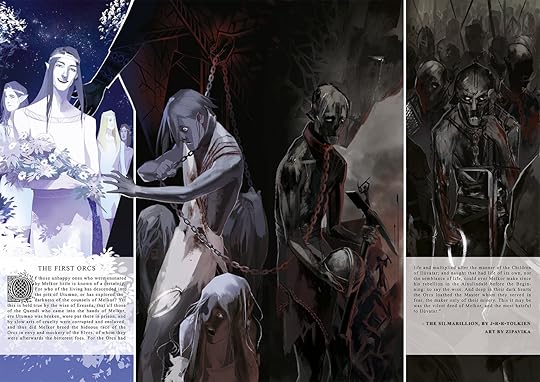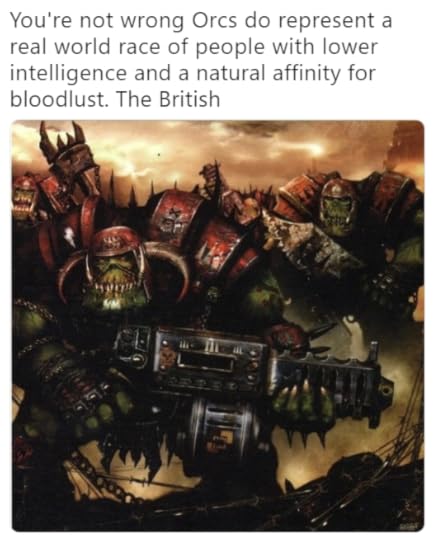Juho Pohjalainen's Blog: Pankarp - Posts Tagged "mythology"
Orcs - Fantasy, Racial Familiarity, and Mundanity
I've seen a lot of discourse about fantasy racism these past couple days, especially with the context of orcs. This got me thinking about such racial matters in general. I thought I'd throw in my own two cents.

Tolkien - the father of modern fantasy - spawned his nonhuman races out of the old human mythology, fairy tales, and shared consciousness. Elves were like humans except far more magical and spiritually connected to the world; orcs were then the result of basically Lucifer himself getting his grubby hands on some elves; dwarves were the creation of a different god, dwellers under the earth, resilient as stone and greedy for gold and other shining metals; finally, the hobbits just sort of showed up, pudgy little folk with a love for idyllic life and peace, the closest to regular human. Some of them had in common with real-life nationalities and cultures - according to Tolkien himself, dwarves have more than a touch of Jewish in them, orcs Mongolian, and hobbits of course are basically British countryside dwellers - but these had a fairly minor role in their creation, helped by the man himself disliking allegory. All of them were also quite insular and had little to do with the businesses of other races: the Council of Elrond, the races coming together to address a grave issue, was an anomaly that was noted in-universe. On the whole they had strongly mythical roots, and drip with magical and fantastic flavour. All was well.
Then Dungeons & Dragons poached them into its great big fantasy patchwork. Now any player could roll up an elf, a dwarf, or ahobbi halfling; and every DM liked to use orcs as their basic mooks. Half-elves were codified into a race of their own, and soon after, so were the half-orcs... with fairly disturbing implications for the latter, at first. Gnomes were brought along from elsewhere, the enemy ranks swelled with kobolds and gnolls and others, and soon the world teemed with all manner of fantasy races great and small - and they quickly grew a familiar, even a mundane, sight in any fantasy setting.

And once you grow familiar with something, the next step is to explore and expand - to stretch its definitions, to ponder its identity, and to deconstruct what it all means. It didn't take long before the players wanted to be the orc rather than kill it, be it in a game of flipped perspectives where the whole party took up the role of the bad guys, or as a singular heroic individual who's fled home and wants to do good things, or a half-orc whose parents actually loved one another, or an orc wizard, or really just about anything else. At this stage, your imagination is the limit.
By now it seems like D&D's become the new standard bearer of fantasy - the introduction of the concept for most people, the originator of new ideas, and the wellspring of new fantasy and literature. It's next to impossible to write a fantasy story without it having been influenced by D&D in some way or the other - either by embracing it, or by consciously rejecting it. In it, magic and fantasy are a pretty standard fare, all over the place and accessible to everyone. The new races it added later on - genasi, tiefling, and dragonborn among others - followed this trend, each having their cultures and their nations and each blending in with humans just fine. It all tends towards the melting-pot feel, very much a modern concept... and indeed tied to modern sensibilities and attitudes in many other ways as well, the interpretations of morality and good and evil, the ideas of equality and inclusiveness.
All of this finally culminates to the topic of the present - racism. The big question on everyone's lips is, are orcs racist? Do they have to be racist? How to fix it?
But I reject these, and instead bring forth a whole other issue: What difference is there between these races, and plain old humans? How are they not just humans with tusks or pointed ears and other meaningless window-dressing?

The metamorphosis - the mundanization - is now complete. Through the twists and branches of a hundred-year-old evolutionary tree, the roots of mythology are now forgotten. Through intense familiarization and numerous deconstructions and parodies, the magic and fantasy is lost. "Fantasy" is no longer a description, but a genre, with medieval technology and various squat bearded and pointy-eared and green tusked people. The "orc" is no longer a strange mythical horror, he's your neighbour. The cultural counterparts and allegories, once a minor footnote, have grown to the forefront of their identity - because at this point, what else is there?
This is the great underlying issue for me - the dragon that gnaws at the tree of fantasy. I solve it by taking several big steps back. I grab all the nonhuman races and hide them back into the corners of the earth. You have to go looking for them, and therefore they remain fantastic and weird.

But where Tolkien tapped into mythology for his inspiration, I tend to look outward, into the realm of science fiction. My races tend to be substantially more different from humans, with many physical and mental traits that we might find utterly alien, just as they would never understand many facets of humanity.
Peal is not human, and I emphasize this inhumanity whenever it would be relevant. His size, his senses, his natural habitat, the faiths and superstitions drummed into him as a youth, all serve to separate him from humanity even after he's spent many years living among us. He still considers us weird or disgusting in many ways, while we in turn often find his way of thinking difficult to understand. It is a constant theme in the stories starring him - how humans might be viewed from an outsider's perspective.
I still have elves and orcs around, but you're not going to see them any more than you're going to see bugbears, which is very little indeed. I hope that I can maintain their fantastic elements forevermore.


Tolkien - the father of modern fantasy - spawned his nonhuman races out of the old human mythology, fairy tales, and shared consciousness. Elves were like humans except far more magical and spiritually connected to the world; orcs were then the result of basically Lucifer himself getting his grubby hands on some elves; dwarves were the creation of a different god, dwellers under the earth, resilient as stone and greedy for gold and other shining metals; finally, the hobbits just sort of showed up, pudgy little folk with a love for idyllic life and peace, the closest to regular human. Some of them had in common with real-life nationalities and cultures - according to Tolkien himself, dwarves have more than a touch of Jewish in them, orcs Mongolian, and hobbits of course are basically British countryside dwellers - but these had a fairly minor role in their creation, helped by the man himself disliking allegory. All of them were also quite insular and had little to do with the businesses of other races: the Council of Elrond, the races coming together to address a grave issue, was an anomaly that was noted in-universe. On the whole they had strongly mythical roots, and drip with magical and fantastic flavour. All was well.
Then Dungeons & Dragons poached them into its great big fantasy patchwork. Now any player could roll up an elf, a dwarf, or a

And once you grow familiar with something, the next step is to explore and expand - to stretch its definitions, to ponder its identity, and to deconstruct what it all means. It didn't take long before the players wanted to be the orc rather than kill it, be it in a game of flipped perspectives where the whole party took up the role of the bad guys, or as a singular heroic individual who's fled home and wants to do good things, or a half-orc whose parents actually loved one another, or an orc wizard, or really just about anything else. At this stage, your imagination is the limit.
By now it seems like D&D's become the new standard bearer of fantasy - the introduction of the concept for most people, the originator of new ideas, and the wellspring of new fantasy and literature. It's next to impossible to write a fantasy story without it having been influenced by D&D in some way or the other - either by embracing it, or by consciously rejecting it. In it, magic and fantasy are a pretty standard fare, all over the place and accessible to everyone. The new races it added later on - genasi, tiefling, and dragonborn among others - followed this trend, each having their cultures and their nations and each blending in with humans just fine. It all tends towards the melting-pot feel, very much a modern concept... and indeed tied to modern sensibilities and attitudes in many other ways as well, the interpretations of morality and good and evil, the ideas of equality and inclusiveness.
All of this finally culminates to the topic of the present - racism. The big question on everyone's lips is, are orcs racist? Do they have to be racist? How to fix it?
But I reject these, and instead bring forth a whole other issue: What difference is there between these races, and plain old humans? How are they not just humans with tusks or pointed ears and other meaningless window-dressing?

The metamorphosis - the mundanization - is now complete. Through the twists and branches of a hundred-year-old evolutionary tree, the roots of mythology are now forgotten. Through intense familiarization and numerous deconstructions and parodies, the magic and fantasy is lost. "Fantasy" is no longer a description, but a genre, with medieval technology and various squat bearded and pointy-eared and green tusked people. The "orc" is no longer a strange mythical horror, he's your neighbour. The cultural counterparts and allegories, once a minor footnote, have grown to the forefront of their identity - because at this point, what else is there?
This is the great underlying issue for me - the dragon that gnaws at the tree of fantasy. I solve it by taking several big steps back. I grab all the nonhuman races and hide them back into the corners of the earth. You have to go looking for them, and therefore they remain fantastic and weird.

But where Tolkien tapped into mythology for his inspiration, I tend to look outward, into the realm of science fiction. My races tend to be substantially more different from humans, with many physical and mental traits that we might find utterly alien, just as they would never understand many facets of humanity.
Peal is not human, and I emphasize this inhumanity whenever it would be relevant. His size, his senses, his natural habitat, the faiths and superstitions drummed into him as a youth, all serve to separate him from humanity even after he's spent many years living among us. He still considers us weird or disgusting in many ways, while we in turn often find his way of thinking difficult to understand. It is a constant theme in the stories starring him - how humans might be viewed from an outsider's perspective.
I still have elves and orcs around, but you're not going to see them any more than you're going to see bugbears, which is very little indeed. I hope that I can maintain their fantastic elements forevermore.

Pankarp
Pages fallen out of Straggler's journal, and others.
Pages fallen out of Straggler's journal, and others.
...more
- Juho Pohjalainen's profile
- 352 followers



